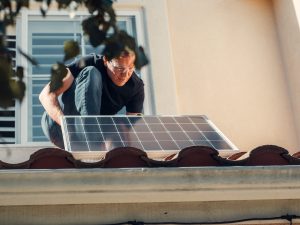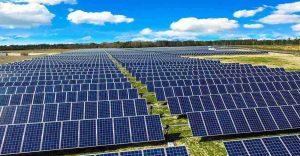What is the short paragraph of solar panel?

What is the short paragraph of solar panel?
What is the short paragraph of solar panel?
Introduction
Solar panels a marvel of modern technology have become synonymous with sustainable energy solutions. As we venture into the world of solar power understanding the composition and functionality of solar panels is crucial. This article will guide you through the essentials from the basic components to the intricate workings of these photovoltaic wonders. What is the short paragraph of solar panel?
Composition of Solar Panels
Overview of Solar Panel Structure
At first glance a solar panel may seem like a simple piece of equipment but it comprises several intricate layers. The basic structure involves photovoltaic cells sandwiched between protective layers of glass and encased in a durable frame. Each component plays a pivotal role in harnessing sunlight and converting it into electricity.
Breakdown of Key Components
Delving deeper let explore the primary components of a solar panel. The photovoltaic cells often made of silicon are the heart of the system. They absorb sunlight and initiate the process of generating electrical currents. The sturdy glass covering protects these cells from environmental factors while the frame ensures structural integrity.
How Solar Panels Work
Conversion of Sunlight into Electricity
The magic happens when sunlight strikes the surface of the solar panel. Photons in the sunlight energize the electrons in the photovoltaic cells creating an electric current. This direct current DC is then converted into alternating current AC by an inverter making it suitable for powering homes and businesses.
Role of Photovoltaic Cells
Understanding the role of photovoltaic cells is crucial. These cells commonly made of crystalline silicon facilitate the conversion of sunlight into electricity through the photovoltaic effect. The interconnected cells form a solar module and when combined they create a solar panel capable of generating a significant amount of power.
Types of Solar Panels
Monocrystalline vs. Polycrystalline Panels
When choosing a solar panel one must consider the type. Monocrystalline panels known for their efficiency consist of singlecrystal silicon while polycrystalline panels utilize multiple crystals. Each has its advantages and the choice depends on specific needs and budget constraints.
ThinFilm Solar Panels
Thinfilm solar panels a lighter and more flexible alternative are gaining popularity. These panels use thin layers of semiconductor materials offering versatility in applications and installation.
Advantages of Solar Panels
Renewable Energy Source
One of the primary advantages of solar panels is their reliance on a renewable energy source—sunlight. Unlike fossil fuels sunlight is an abundant resource that can be harnessed without depleting finite reserves.
Environmental Benefits
The environmental impact of solar energy is profound. By generating electricity without emissions solar panels contribute to a cleaner and healthier planet. Reduced reliance on traditional energy sources also helps mitigate climate change.
Cost Savings
While the initial investment in solar panels may seem substantial the longterm cost savings are undeniable. Lower energy bills and potential government incentives make solar panels an economically viable choice.
Installation Process
Steps Involved in Installing Solar Panels
Installing solar panels involves several key steps. From site assessment and obtaining necessary permits to mounting the panels and connecting the system a careful and precise installation is essential for optimal performance.
Considerations for Optimal Placement
Choosing the right location for solar panels is critical. Factors such as sunlight exposure shading and roof orientation play a significant role in maximizing energy production. A strategic placement ensures the panels capture the maximum sunlight throughout the day.
Maintenance Tips
Regular Cleaning and Inspection
To maintain peak efficiency regular cleaning and inspection are essential. Dust dirt and debris can accumulate on the surface reducing the panel ability to absorb sunlight. Periodic checks for any damage or malfunctions are equally important.
Common Issues and Troubleshooting
Solar panels may encounter issues over time. From electrical issues to physical damage understanding common problems and having a troubleshooting plan in place is crucial for uninterrupted energy production.
Solar Panel Efficiency
Factors Affecting Efficiency
Solar panel efficiency is influenced by various factors including the quality of materials used environmental conditions and technological advancements. Keeping abreast of the latest innovations can help consumers choose highefficiency panels.
Latest Technological Advancements
In the everevolving field of solar technology advancements are continual. From improvements in photovoltaic cell efficiency to the development of smart solar panels staying informed about the latest breakthroughs is key.
Environmental Impact
Reduced Carbon Footprint
The adoption of solar panels contributes significantly to reducing the carbon footprint. By producing clean energy and reducing reliance on fossil fuels individuals and businesses can actively participate in the global effort to combat climate change.
Contribution to Sustainable Living
Embracing solar energy aligns with sustainable living practices. Beyond individual benefits widespread adoption of solar panels can contribute to a more sustainable and resilient energy infrastructure.
Solar Panel Applications
Residential Use
Solar panels are increasingly common in residential settings. Homeowners can harness solar power to meet their energy needs potentially even becoming energyindependent. The installation of solar panels can also increase property value.
Commercial and Industrial Applications
Beyond homes solar panels find extensive use in commercial and industrial applications. Businesses can significantly reduce operational costs and demonstrate a commitment to environmentally friendly practices by integrating solar energy into their operations.
Government Incentives and Policies
Overview of Subsidies and Tax Credits
Governments worldwide are incentivizing the adoption of solar energy through subsidies and tax credits. Understanding the available incentives and policies can make the transition to solar power more financially feasible.
Encouraging Renewable Energy Initiatives
Government policies play a crucial role in fostering renewable energy initiatives. From setting renewable energy targets to supporting research and development policymakers are pivotal in shaping the future of solar energy.
Future Trends in Solar Technology
Emerging Innovations in Solar Panel Design
The future of solar technology holds exciting possibilities. Innovations such as transparent solar panels and solar paint are on the horizon promising to revolutionize how we harness and integrate solar energy into our daily lives.
Integration with Smart Technologies
As technology advances so does the integration of solar panels with smart technologies. From energy storage solutions to realtime monitoring the smartification of solar systems enhances efficiency and user control.
Challenges and Solutions
Addressing Current Limitations
While solar panels offer immense benefits there are challenges to address. Issues like intermittency and energy storage need innovative solutions. Ongoing research and development efforts aim to overcome these limitations and make solar energy even more accessible.
Research and Development Efforts
The commitment to advancing solar technology is evident in ongoing research and development. From enhancing energy storage capabilities to improving overall system efficiency scientists and engineers are dedicated to overcoming current challenges.
Consumer Considerations
Factors to Consider Before Investing in Solar Panels
For consumers contemplating the switch to solar energy several factors merit consideration. From assessing energy needs to understanding financing options an informed decision is crucial. Consulting with professionals can provide personalized insights.
Choosing the Right System for Specific Needs
Not all solar panel systems are created equal. Tailoring the choice of solar panels to specific needs whether residential or commercial ensures optimal performance and a satisfactory return on investment.
Final Word
In the journey into the world of solar panels unveils a promising future for clean and sustainable energy. From the intricate composition of solar panels to their diverse applications and the ongoing advancements in technology solar energy is reshaping how we power our lives.
FAQs
- Are solar panels suitable for all types of homes?
- Solar panels can be adapted to various home types. Factors like roof orientation and shading should be considered for optimal results.
- What maintenance is required for solar panels?
- Regular cleaning and occasional inspections are essential. Professional maintenance may be needed for more complex issues.
- Do solar panels work in cloudy weather?
- While solar panels are most effective in direct sunlight they can still generate electricity on cloudy days albeit at a reduced rate.
- How long do solar panels typically last?
- Solar panels have a lifespan of 2530 years or more. Regular maintenance can extend their longevity.
- Is it possible to store excess energy generated by solar panels?
- Yes energy storage solutions like batteries allow homeowners to store excess energy for later use.

Source of Image: https://www.pexels.com/photo/satellite-space-universe-solar-23763/






